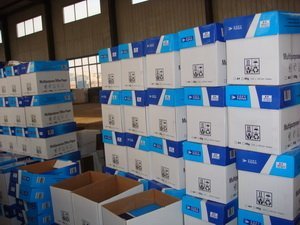 For a society bent on becoming paperless I find it rather amusing that sales at corporate giant International Paper Company actually increased from $21.9B in 2006 to $25.1B in 2010. It doesn't sound like the demand for paper is diminishing, does it? In reality, printing is being offset from one party to another. To illustrate, the many community and civic newsletters which used to clog our mail boxes have been replaced by PDF files which are commonly e-mailed or downloaded from web sites. People print them in part or in full as opposed to the publisher, thereby transferring publication costs to the consumer.
For a society bent on becoming paperless I find it rather amusing that sales at corporate giant International Paper Company actually increased from $21.9B in 2006 to $25.1B in 2010. It doesn't sound like the demand for paper is diminishing, does it? In reality, printing is being offset from one party to another. To illustrate, the many community and civic newsletters which used to clog our mail boxes have been replaced by PDF files which are commonly e-mailed or downloaded from web sites. People print them in part or in full as opposed to the publisher, thereby transferring publication costs to the consumer.
Financial institutions were quick to jump on the bandwagon. Most, if not all banks in this country have abandoned printing and mailing monthly statements thereby forcing the consumer to print them instead. Reluctantly, they'll still mail you statements if you must have them, but they desperately want to get out of the printing business. The government has followed suit. Whereas taxpayers used to get their IRS booklets and forms through the mail, now the consumer is expected to download and print it themselves. No wonder the United States Postal Service is going broke, there is nothing to mail anymore.
Our company has maintained a post office box for a number of years now. In the past we could count on receiving at least 100 pounds of junk mail annually, but this has dropped off substantially. Now we barely get a post card. Instead, our e-mail queues are overloaded with spam despite the blockers we have in place. If we find an ad for something we are interested in, we'll dutifully print it (not the retailer).
Perhaps the two biggest areas of e-paper is in travel reservations and retail sales. For example, airline tickets in the past were printed and mailed to you. Now, the consumer is expected to print them instead. The same amount of paper is produced, only you are paying for it. Retail sales are no different; the consumer must print a receipt if he is so inclined, not the vendor.
When you walk into an office supply store, one of the biggest items commanding your attention are the skids of stock paper available to you. Somebody must be buying all this paper, and most likely it is the consumer as opposed to businesses who have it delivered directly to their offices. Aside from paper sales, the sale of printers, cartridges, and paper shredders are also doing well, thereby indicating a robust print industry is still alive and well.
The transition of printing costs directly impacts your cost of living. Sure, paper is relatively cheap, but the cost of printers and ink cartridges add up over a year's time. Going paperless may reduce the costs of the organization producing the documents, but it certainly adds to the cost of the consumer, such is the price of progress I guess. No wonder sales at International Paper is increasing unabated. Maybe the folks at Dunder-Miflin are on to something after all (from NBC's "The Office").
So, is the world really going paperless? Ask International Paper.
Keep the Faith!
Note: All trademarks both marked and unmarked belong to their respective companies.
 Tim Bryce is a writer and the Managing Director of M. Bryce & Associates (MBA) of Palm Harbor, Florida and has over 30 years of experience in the management consulting field. He can be reached at timb001@phmainstreet.com
Tim Bryce is a writer and the Managing Director of M. Bryce & Associates (MBA) of Palm Harbor, Florida and has over 30 years of experience in the management consulting field. He can be reached at timb001@phmainstreet.com
For Tim's columns, see:
http://www.phmainstreet.com/timbryce.htm
Like the article? TELL A FRIEND.
Copyright © 2012 by Tim Bryce. All rights reserved.
No comments:
Post a Comment